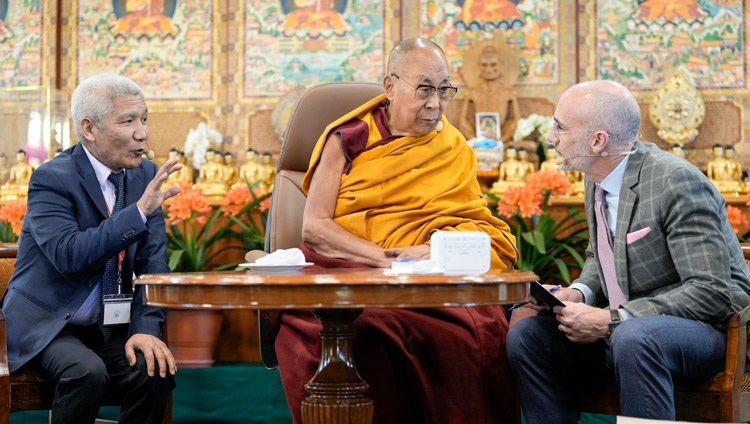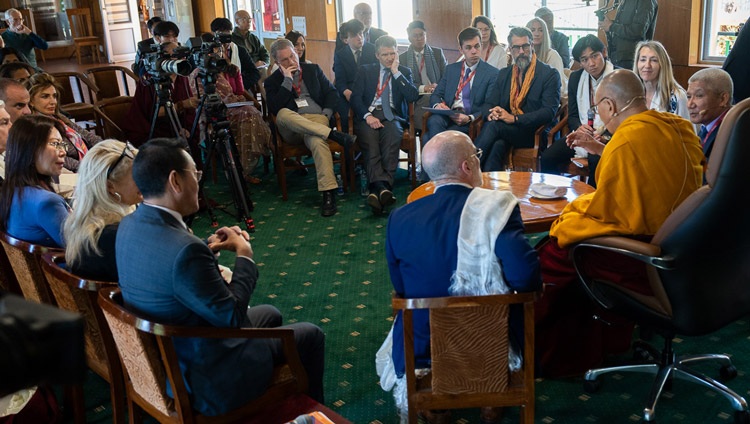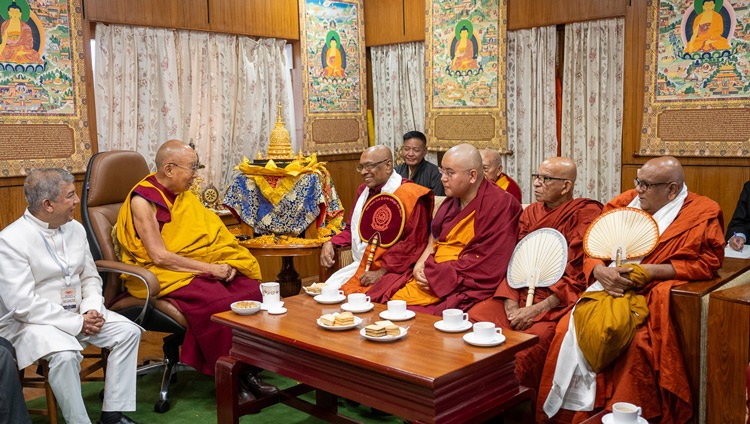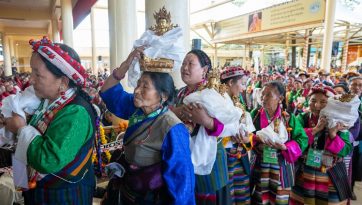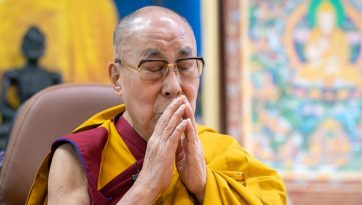Compassion and Mercy — Common Values between Islam and Buddhism
September 28, 2020
Thekchen Chöling, Dharamsala, HP, India – This morning, His Holiness the Dalai Lama came into the room in his residence that has been arranged for him to engage in video link conversations with people around the world. He scanned the faces of the Malaysia participants on the screens before him, smiled, greeted them and took his seat.
A conversation about Compassion and Mercy, values common to Islam and Buddhism, had been organized by the Muslim Youth Movement of Malaysia (ABIM) and the Tibetan Buddhist Culture Centre (TBCC), Malaysia. President of TBCC, Casey Liu, welcomed His Holiness and the other participants. He invited Muhammad Faisal Abdul Aziz, President of ABIM and moderator for the session to begin. He began with the common Muslim greeting, “As-salamu alaykum” and introduced His Holiness. He mentioned his commitment to promoting awareness of the oneness of humanity, inter-religious harmony, the preservation of Tibetan culture and the environment of Tibet, as well as the revival of ancient Indian knowledge.
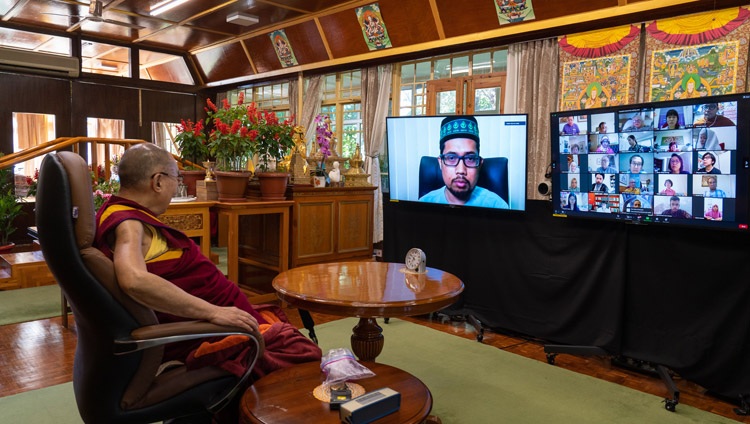
Next, he introduced Professor Emeritus Datuk Osman Bakar, who holds the Al-Ghazzali Chair of Epistemology and Civilizational Studies at International Institute of Islamic Thought and Civilization (ISTAC). He invited Prof Osman to open the conversation.
The professor also opened with “As-salamu alaykum”, adding in English, “Peace be unto you.” He declared it a great honour and privilege to take part in a conversation with His Holiness. He explained that this virtual meeting was important for Malaysia because Islam and Buddhism are the two largest religions in the country and the South-East Asian region. He noted that the purpose of such inter-religious dialogue is to identify what the traditions have in common in order to nurture a culture of mutual respect.
Prof Osman stated that mercy is the essence of Islam. The Arabic word for it from the Quran is ‘rahmah’ and it may be defined as compassion, love, mercy, kindness and so forth. It is comparable to what ‘karuna’ or compassion means to Buddhists and what ‘agape’ or love signifies for Christians. Mercy, he said, is the most divine attribute of God, who is described as ‘most gracious’ and ‘most compassionate’. ‘Mercy to the world’ is one of the epithets of the Prophet Muhammad, who was especially compassionate to orphans, the poor, the weak and oppressed.
Prof Osman also remarked that the divine law of Islam (Shari’ah) was given as guidance and mercy by God the lawgiver, not out of a sense of compulsion or punitive enforcement, but out of his compassion, mercy, and kindness. The Professor concluded that since all human beings have a seed of compassion and mercy, these qualities are among their essential attributes.
Invited to respond, His Holiness began, “Firstly, it’s a great honour for me to meet with Malaysian Muslims. During my childhood, in my small, remote village there were Muslim families among our neighbours. Then, when I reached Lhasa, I learned that it was a tradition of the Tibetan Government to invite representatives of the Muslim community to all official functions. Historically, during the time of the Fifth Dalai Lama, some Muslims from Ladakh found their way to Lhasa. The Dalai Lama made them welcome and granted them a piece of land on which to build a mosque.
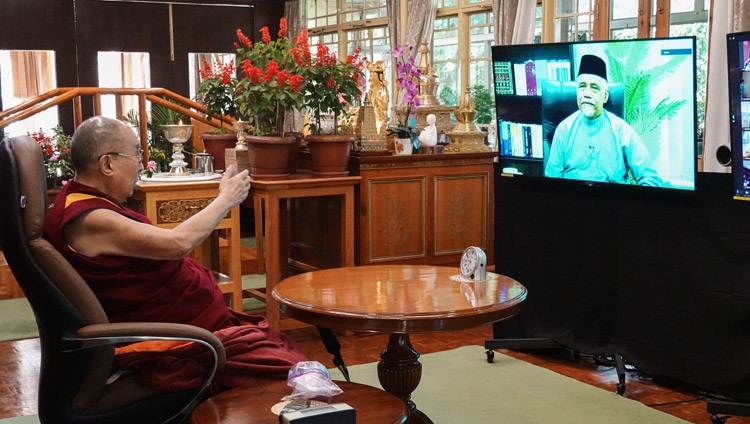
“Then I have another story to tell of my association with Muslims that is at least half-serious. The Tibetan Government had sent out delegations to seek the reincarnation of the Thirteenth Dalai Lama. There had been indications that he had been born in Amdo. The delegation to the area around Kumbum, where I’m from, made a short-list of three boys. My mother told me that one of them passed away. The remaining two came to the attention of the local warlord, Ma Bufang.
“My mother recalled that when the other boy was brought to Ma Bufang in his mother’s arms, he was shy and scared. The warlord offered him sweets, but he reached out and grabbed a handful and turned away. When my mother brought me to him, I was apparently composed and unafraid. And when he offered me sweets, I took one for my mother and one more for myself. He looked me in the eye and said, ‘This boy is the Dalai Lama’. So, we could say that this Dalai Lama was first recognised by a Muslim warlord. Anyway, there seems to have been some special connection.
“Later on, in Lhasa, I became aware that Namgyal Monastery monks from the Potala were particularly fond of visiting the shops belonging to Muslims. There they gathered information about India and sometimes enjoyed delicious Muslim food.
“One of my commitments is to encouraging harmony among our different religious traditions. The simple reason for this is that they all teach compassion. A sense of concern for other beings is part of human nature. Human life depends on living in a community. When we are born, we are nurtured by our mother’s affection, which is the start of our lives as social creatures.
“In our world today, everyone wants to live a happy life and indeed everyone has a right to a happy life. Yet we face problems, many of which are of our own making. If we look a little deeper, we may see that loving kindness is the key to our survival — and all religions teach the virtue of kindness and compassion.”
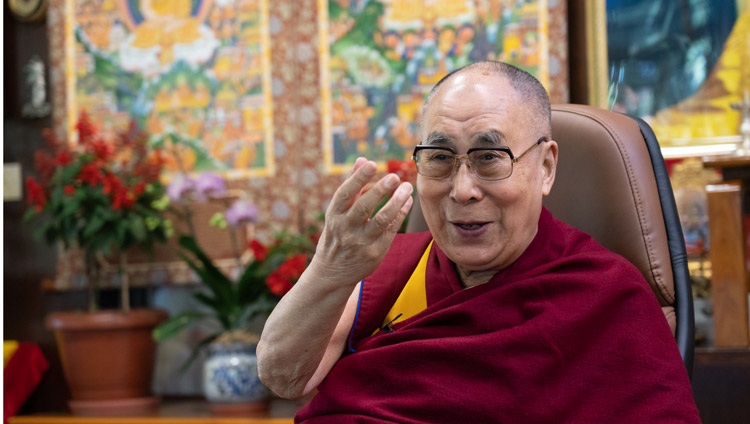
His Holiness explained that theistic religions believe in God or Allah, whose very nature is loving kindness. In India there are also long-standing traditions of non-violence and compassion, as well as practices for training the mind in concentration and insight. These can lead to understanding how to tackle our negative emotions. Even before the coming of the Buddha, Indians explored how to train the mind and use intelligence to increase positive emotions and reduce negative ones.
The Buddha emphasized compassion. The Jains stressed non-violence and the Prophet Muhammad, despite carrying a sword, conveyed a message of kindness and providing help to our fellow beings. Jesus Christ likewise proclaimed the importance of love.
“Today, we need compassion to create a happier world. Unfortunately, in recent times, there has been less interest in compassion and more enthusiasm for developing weapons with which to destroy others. We need to learn how to develop peace of mind by taking a secular approach to cultivating compassion. We must learn how to tackle our destructive emotions, which I refer to as observing emotional hygiene.
“It is crucial that we work to encourage inter-religious harmony because we still see too many cases of fighting and killing in the name of religion. It is particularly sad when traditions whose purpose is to foster love and compassion become a cause of violence. We all have a responsibility to help resolve such conflicts. For example, although I’ve not heard of any quarrel between the Shia and Sunni traditions in India, I believe such antagonism takes place elsewhere.
“As a Buddhist monk, I’m committed to encouraging harmony and respect among religious traditions.”
Prof Osman responded that he could not agree more. He asked His Holiness what can be done to strengthen what religious traditions have in common. His Holiness told him that, starting in 1975, he had adopted a practice of, whenever and wherever he could, paying his respects at other traditions’ places of worship. On that first occasion he was in Sarnath and visited a church, a mosque, as well as a Hindu and a Buddhist temple.
Another time, in Rewalsar, he visited several places of worship around a sacred lake. The final stop was at a Gurudwara, where Sikhs worship. The custom is to give pilgrims a handful of ‘prasad’ or blessed food and His Holiness remembers being particularly grateful for it.
He added that on a visit to Jerusalem, he had made a point of visiting churches, mosques and synagogues and paid his respects at each.
Prof Osman observed that more compassion is needed everywhere today and asked how to develop it. His Holiness reiterated that if we learn to tackle our destructive emotions, we’ll be able to achieve peace of mind. Anger and fear lead to a restless mind. However, the more compassionate you are, the more you’ll set your mind at rest. His Holiness declared that in terms of achieving peace of mind, cultivating compassion is far more effective than taking tranquilizers.
Several questions were raised by members of the audience. The first concerned how to respond to those who misinterpret religious teachings. His Holiness replied that in today’s world it’s always possible to be in touch with other people, so it’s possible to learn from them. Amongst Buddhists there are four schools of thought who hold differing philosophical views. What he felt was important was not to retreat into isolation, but to reach out and maintain good relations with religious brothers and sisters.
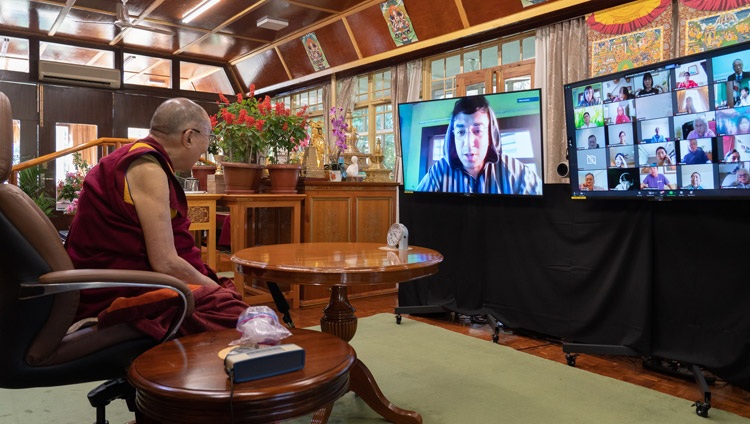
Prof Osman suggested that it was important to distinguish between different interpretations of the teachings and misinterpretations. He conceded that religious instruction can be interpreted in different ways.
Another questioner asked how to apply compassion in day to day activities and how to teach this to children. His Holiness observed that young children are very open. They have little interest in superficial differences among their companions. However, once they go to school little is said to support inner values and secondary differences between people are highlighted. Prof Osman quoted the Quran as teaching that kindness begins at home — it says be kind to parents and honour them.
A question was raised about self-centredness or ego. His Holiness advised making a distinction between attachment and compassion. When we are moved by attachment, he said, we tend to see others in terms of ‘us’ and ‘them’. He added that there is a difference between appearance and reality. Destructive emotions arise on the basis of appearances, whereas compassion is founded on a deeper understanding of reality.
“Today, the world is interdependent as never before, which is why we need a keen sense of the oneness of all human beings. We have to take the whole of humanity into account. We have to understand what we have in common with everyone else.”
Prof Osman remarked that Shari’ah offers guidance. Prayer has the effect of weakening self-centredness, as does fasting and ‘zakat’ or charity.
Invited to say what Muslims and Buddhists can learn from each other, His Holiness suggested that when we notice differences in our approaches, we should remember our common goal of compassion. To strengthen human values, we need to use human intelligence. People in different times, different places and pursuing different ways of life need different ways to strengthen their inner values. He stressed the importance of Buddhists, Muslims and others taking the opportunity to meet and discuss the different ways they approach these things. Prof Osman supported the idea of dialogue as a means to do this.
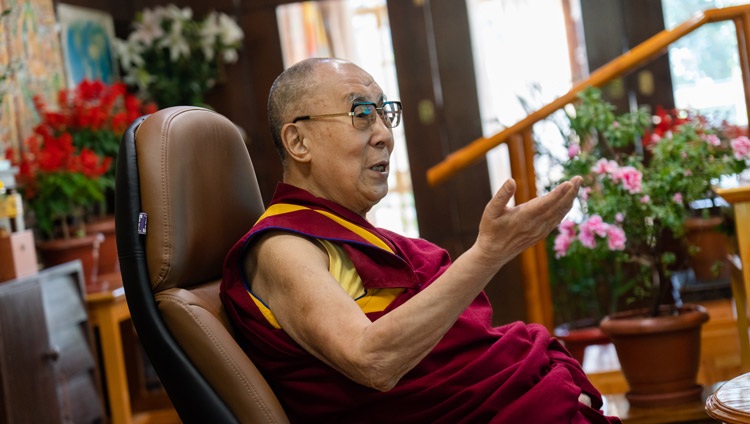
As to how to put love and compassion into action, His Holiness reminded everyone that nearly all of us begin our lives basking in our mother’s love and affection. Then as we grow up, we find that to be happy it’s important to help each other. He repeated that his first commitment is to share with as many people as possible the need to appreciate the oneness of humanity.
“We are all essentially the same in being human. In the past people and communities live in isolation from each other, but today we are closer to one another and we have to learn to work together.”
Prof Osman recommended thinking of the common good.
The moderator thanked His Holiness, Prof Osman and all the other guests who had contributed to the discussion. Casey Liu added his thanks and expressed the hope that His Holiness might visit Malaysia. He responded that he looked forward to the possibility, once pandemic related restrictions have been lifted. He mentioned that if he did, he would remember Tunku Abdul Rahman, the Malaysian leader who had been so helpful when the issue of Tibet was raised at the United Nations.
His final words, as he smiled and waved to the people on the screens, were, “See you again.”
SOURCE: Dalailama.com
https://www.dalailama.com/news/2020/compassion-and-mercy-common-values-between-islam-and-buddhism

